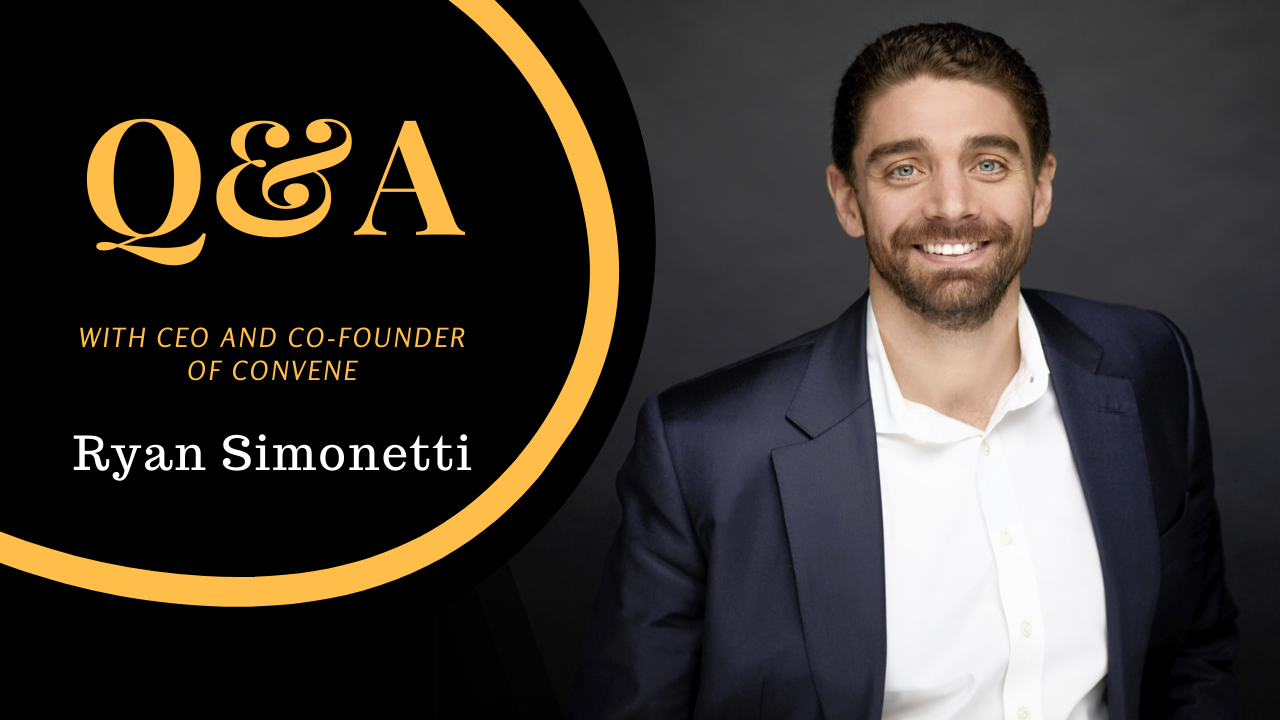- As workers slowly return to the workplace, one burning question is how can organizations conduct safe in-person meetings?
- Allwork.Space spoke with Ryan Simonetti, CEO and co-founder of Convene, to discuss best practice protocols and how Convene is adapting to the current situation.
- Simonetti believes that the future of meetings for the next 12-24 months and in the long term is going to be hybrid.
Flexible spaces around the world are gradually re-opening and welcoming clients back to their offices. It’s not a return to normality — it’s a work in progress. But for thousands of home-weary workers, the opportunity to get back to the workplace is a welcome relief.
One question that remains is, how do we conduct safe meetings? Is it possible to allow groups of people into a conference room? What are the best practice protocols? Are people even considering in-person meetings at this point?
Allwork.Space approached Ryan Simonetti, CEO and co-founder of Convene, to find out.
As their name suggests, meetings and conferences are integral to Convene. The company works in partnership with commercial landlords to manage 800,000+ sq ft of meeting and event space, which generates 75% of their revenue. The rapid onslaught of Covid-19 dealt a huge blow to their operations, as all of their meeting spaces were temporarily closed along with hospitality, event and catering services.
In this Q&A, Ryan Simonetti shares how Convene is adapting to the current situation, and how hybrid part-virtual, part-physical meetings could become the new norm.
Allwork.Space: Tell us about your experiences over the past few months. Did you make the decision to temporarily close your spaces?
Ryan Simonetti: In light of our desire to stop the spread of COVID-19, local governmental shelter-in-place orders, and recommendations from the CDC to limit in-person gatherings, we have temporarily closed all of our meetings locations, cafés in Convene-managed spaces, and Club 75 at 75 Rockefeller Plaza until further notice.
Locations with WorkPlace are still accessible by our members, but without Convene staff or culinary offerings. WorkPlace locations will continue to have nightly cleanings and weekend deep cleanings.
Allwork.Space: What kind of short-term changes are you implementing in your meeting spaces to enable people to use them safely?
In the immediate future, Convene is implementing robust operational changes meant to enforce rigorous cleaning protocols and physical distancing. These changes include:
- Implementing testing, active monitoring, daily screening & temperature checking through their Eden Health partnership;
- Increasing frequency of cleaning and disinfection of high-touch areas and weekly electrostatic mistings to disinfect surfaces;
- De-densifying WorkPlace & repurposing Meetings rooms where possible;
- Improving air quality through MERV-13 & bipolar ionization filtration solutions and mobile air purification units;
- Updating food & beverage and hospitality standards offering pre-boxed chef-prepared lunches and snacks with single-use and disposable cutlery delivered to the desk or meeting.
We are also increasing communication and transparency by implementing a new social contract and updating our house rules to guide behavior in the space.
Allwork.Space: And what about longer-term changes, such as new tech solutions or redesign of your spaces?
We have recently launched Virtual Meetings, which is a virtual technology platform that builds a new UI/UX experience on top of existing technology like Zoom for engagement. Then, Convene’s professional meeting planners and technology professionals actually manage that virtual event on behalf of our customers.
Over the last 30 days, we’ve hosted a number of those virtual events and we’ve seen a lot of physical meetings actually convert to virtual meetings.
We see this as another huge growth opportunity for the company, not just in the short term; it’s also opening Convene up to an entire offering that didn’t exist before.
In our virtual meetings, we’re not bound by physical space and inventory. We think that this virtual technology platform is a huge opportunity for Convene over the next 6 months and also long into the future.
Allwork.Space: How will in-person meetings take place over the coming months, and how do you see this gradually changing as we move forward into 2021?
Right now, we have no meeting spaces that are open yet. However, we are seeing bookings for Q3-Q4 of 2020 and into 2021.
We’re looking at the second half of 2021 for large gatherings. The future of meetings for the next 12-24 months and in the long term is going to be hybrid.
Virtual meetings will combine a smaller, physical experience on-site, with simulcasting or live-streaming to a virtual audience. At Convene, we’ve done this for the past 10 years and we’re seeing a lot of meeting confirmations for the end of this year that have both a physical and virtual component.
We are seeing a huge opportunity right now to host those smaller meetings at a physical Convene location, a safe environment, and then broadcast that meeting to a larger virtual audience.
Allwork.Space: What is the impact on design of meeting rooms? How can our industry better accommodate ‘combo’ meetings that include in-person and remote simultaneously?
Capacity for all of our meeting rooms now take into account a six-foot diameter spacing standard. Depending on set-up style, capacities may cap at 25% to 50% of previous maximum capacity. Hybrid offers are available to supplement these lower capacities virtually.
Operators who have a good understanding of what “hybrid” means, or the blend of in-person and virtual experiences, will be able to meet the needs of today’s workforce. This requires a depth of knowledge in design, technology, and hospitality to make the experience work.
Allwork.Space: Finally, what are your thoughts on the future of the flexible space sector as we emerge from the health crisis?
There’s so much uncertainty right now for businesses and, as a result, we are seeing an increased appreciation for the flexibility and operational conveniences that Convene can offer. Companies will still need an office since face-to-face collaboration isn’t going anywhere. But they will not dramatically increase the square footage they take. I think this will further support and accelerate our business.
The hybrid workplace experience is our focus, because employees now have greater flexibility to work from an office, whether that be a company’s HQ or a distributed office, from home, or from a third place like a coffee shop.
My sense is that in the long term, hybrid workplaces will become the norm. It’s all about supporting work and meetings wherever they happen.



 Dr. Gleb Tsipursky – The Office Whisperer
Dr. Gleb Tsipursky – The Office Whisperer Nirit Cohen – WorkFutures
Nirit Cohen – WorkFutures Angela Howard – Culture Expert
Angela Howard – Culture Expert Drew Jones – Design & Innovation
Drew Jones – Design & Innovation Jonathan Price – CRE & Flex Expert
Jonathan Price – CRE & Flex Expert














